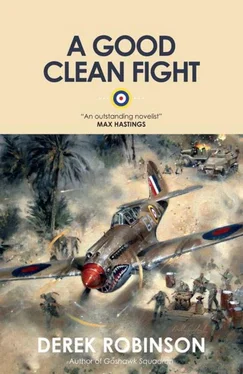* * *
“There you go,” said the Army Censor. “Best I can do, I’m afraid.”
Henry Lester took the typewritten pages from him and flicked through them. Almost at once he felt a stoniness in his stomach. He recognized the sensation and he hated it. Even after two years of reporting this war he was still not immune to its horrors. He shuffled the pages into a bundle and fanned himself with it. He had expected losses, you always got some losses, but this was a massacre. Blue pencil ran from end to end. Whole paragraphs were wiped out. The bastards hadn’t censored his story, they’d carpet-bombed it. “I can’t send this,” he said.
“That, of course, must be your decision.”
“It won’t mean a damn in Chicago.”
“Possibly not. I’ve never been to Chicago.” That sounded as if it might possibly be construed as a somewhat harsh comment, so the Army Censor added: “I must say I did enjoy your little reference to the Poles.”
“So why kill it?”
“Ah… policy, old chap, policy.”
Lester felt his heart begin to pound. That piece about Polish troops had cost him two days’ research. “I want to see your boss,” he said.
“Colonel Knibbs? I’ll try , but…” He picked up the phone.
Lester waited an hour and ten minutes outside the Chief Censor’s office while, inside, a foul-tempered argument simmered and occasionally boiled over. At last, two disgruntled officers, both much-decorated and deeply sunburned, came out and Lester was shown in. Colonel Knibbs, tall and thin with half-moon glasses propped on his forehead, was standing by the window, drinking tonic water from the bottle as he looked down at the crowded street. “If you were to shut your eyes and chuck ten bricks out of this window,” he said, “I bet you’d hit one enemy agent on the head. Possibly two.”
“Can I quote you?”
“Alas, no.”
“No.” Lester sat down but the seat was hot, so he found a cool one. “Looks to me like I can’t say anything.” He held up his censored story by the corner, letting it dangle like a small dead animal.
“Well, you certainly can’t send that. It amounts to an explanation of our loss of Benghazi.” Knibbs spoke sharply.
“None of which will come as a surprise to Rommel.”
Knibbs finished his tonic and let the bottle drop into a waste basket. “Let me tell you what those two officers were so angry about, Mr. Lester,” he said. “They got out of Benghazi before it fell. Now, there were many reasons why Rommel was able to take Benghazi so easily, and most of them are in your excellent but doomed report. Superior armor, shorter supply-lines, poor British communications, and so on. But, as I’m sure you know, everyone in the desert listens to the BBC news, and the morale of our men was considerably damaged when some idiot in London announced on the BBC that Benghazi was indefensible, that as a battleground it was impossible to hold.”
“Yeah, I heard something about that,” Lester said.
“Those officers heard all about it. They were desperately trying to organize a confused jumble of men who were tired and hungry and who had lost half their weapons, and who were getting bombed by the Luftwaffe every twenty minutes and shelled by the Italians every ten, and to put the tin hat on it, every hour on the hour the BBC came in loud and clear saying Benghazi hadn’t got a hope.”
“Not smart.”
“They blame me,” Knibbs said. “Understandable. I’m the nearest censor. Nothing to do with me, of course. I don’t control the BBC. Nevertheless, I think it’s time we gave Benghazi a rest.”
“What about the Poles?” Lester asked. He pointed to the censored paragraphs. “They weren’t there. I put them in for contrast. The Poles fight like hell.”
“And if they get captured, the Germans promptly shoot them. Not always, but often enough. So, for the Poles’ sake, no tales of Polish ferocity. Not for a while, anyway.”
Lester went home. His wife took one look at him and returned to her book. “And you can shut up, for a start,” he said.
* * *
Lampard sat at a desk in a spare room at Senso Unico and carefully scanned the typewritten sheets listing the names of officers recently killed in action in the Western Desert.
He paid no attention to anyone above the rank of captain; nor was he interested in New Zealanders or Australians or Indians. He was looking for junior officers in English regiments (not Scottish) and only in certain regiments at that—the closer to London, the better. He might accept the Gloucestershires, at a pinch, but not the Durham Light Infantry, and certainly not the Lancashire Fusiliers.
Then he looked at the next-of-kin. Most of the addresses were in England, but a few were in Cairo or Alexandria. After all, Egypt was a neutral country; you couldn’t stop somebody’s wife living there if she could wangle the passage. India was full of officers’ wives, and when their husbands got posted to Egypt the wives sometimes followed. And occasionally a chap met an English girl in Cairo working as a secretary at GHQ or the embassy, and married her.
Lampard made a short-list of nine, all first-lieutenants or captains from decent regiments, with next-of-kin living in Cairo. He studied the addresses and crossed out two. Wrong parts of town. He stared hard at the remaining seven names: Benson, Challis, Fitzroy, d’Armytage, Tait, Spencer and Cox. He didn’t like Tait, it looked hard and unpleasant, but he couldn’t think why. He crossed it out. There was something wrong with Cox, too. Lampard frowned and rolled the pencil between his fingertips. Of course. There was a Cox in his patrol. No relation, but Lampard was superstitious about such things. Cox was deleted. That left five.
He returned the lists to the sergeant who had produced them, thanked him and left. It was tea time. Perfect.
* * *
Most people considered Cairo in midsummer too hot for tennis. After the stupefying, relentless, furnace-heat of the desert, Dunn and Gibbon found Cairo quite mild. They played a couple of sets at the Gezira Sporting Club in order to work up a sweat and go for a swim. The luxury of diving into a few hundred thousand gallons of water had the same appeal as an open brewery to a drunk: they kept climbing out for the sheer pleasure of jumping in again.
They were sitting on the marble edge of the pool, legs in the water, skin glittering like fresh paint, when Dunn said, “Funny thing. All the time we’re in the desert I dream about getting back here, and now I’m back here—”
“You can’t wait to go out on patrol again.”
Dunn thrashed the water to a foam. “Oh well,” he said. “I suppose it’s not a very bright remark.”
“Don’t get all depressed, Mike, for Christ’s sake,” Gibbon said. “You’re right, it wasn’t very bright, but that’s nothing to be ashamed of because after all you’re not very bright yourself, are you?”
Dunn stood up, jumped in, heaved himself out and said: “I think I’m fairly bright.”
“If you’ve got to think about it,” Gibbon said, “don’t bother.”
“I passed out tenth from top at my OCTU. Lots of chaps failed OCTU. That shows something, doesn’t it?”
“Shows you’re a good soldier. Good soldiers aren’t bright. Quite the opposite. Good soldiers advance into a storm of withering fire when someone orders them to go and capture something. And guess what happens?”
“They bloody well capture it,” Dunn said stubbornly.
“No, they get withered. It’s what withering fire does. It withers people.” Gibbon looked into the pool and followed a young woman swimming underwater, silver dribbles of air escaping her mouth. “I still haven’t got my MC,” he said. “It’s a swindle.”
Читать дальше












